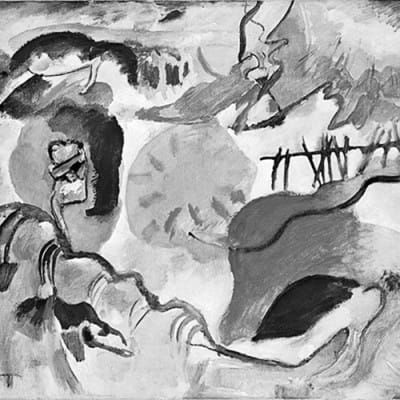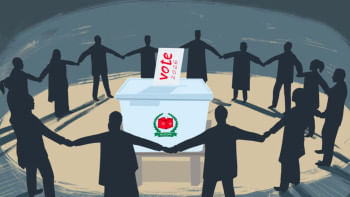The Night of 16th January, 1955

What? You too, my friend? Are you dead in that land you fled to last year, where you chose life for yourself (as you told me at the Coffee House on your last evening in Lahore, a week before you left Pakistan for good), and those two children and the woman, for whom you would have chosen – and once did choose – death with as little hesitation. Or are you alive and yet only a ghost, one of the spectres who have visited me nightly, much to the chagrin of my wife and daughters, who would preserve me from all kinds of spirits. They have always come singly, these ghosts, one at a time, which is the appropriate thing to do when visiting a deathbed. All of them came, from Bari Alig Saheb to Begum, all. But perhaps some of them were spectres of the living, for those alive cast ghosts as well as those dead. That we have known, haven't we, my friend? We have both known the fragile unity of bodies and shadows, and the murder and chaos born from their partition.
Look at the mess I have made of my body. Look. I can hardly speak to you; my throat is parched and it is not water I crave. Not water at all. This evening, coming back from the bar, I vomited blood again. The six-year-old son of my nephew saw it but I managed to convince the boy I had been spitting paan juice. Such petty lies I stoop to these days; I go begging for ten rupees from editors; I ignore the loving regimes of health and abstinence that my family devices to preserve me.
In your last letter you praised the bracing air of your new homeland. I have never smelled air that was purer, you wrote. Ha! How can that be, my friend? How can the air in the lands of infidels be purer than the air in the land of the pure? And what do we have to do, you and me, with purity, except perhaps the artificial purity of our art?
I can see you shaking your head. You believe that the art of life takes precedence over the life of art. If so, my friend, you have chosen a path very different from the one I took. Will it lead you to a greater flowering? Perhaps, if you are not already dead, I will return to sit on your deathbed and we will exchange notes – and insults, as usual.
Can't you find a drop of something for me to drink? Not water, my friend, not water. Not our element, that. We hardly ever drank water together, did we? Not with you or Joshilla or Ashiq or Avik or Doctor Surender or the Taan Kaptaan. Not even with Hari Babu, who was in many ways an artist like me, a man for whom art came first, and not even with Rajkunwar, who never got drunk – that man held his liquor even better than I could. But I would much rather not think of those two. No, I shouldn't. And I can see you do not want to be reminded of their end either, for you have always felt guilty for leaving – though did you have a choice there, my friend? – when you did.
Is that what life always does to art, my friend?
Get me a drop, please. I beg you. Get me something before my family wakes up. Oh, what's the use? You are a bloody ghost.
Or is it me who is a ghost? Did we manage to keep body and shadow together, my friend? And if we did, why am I here, coughing blood in my desperate search for death, and why are you there, driven so far away by your choice of life?
No, my friend, I cannot speak for you. But I believe I am still all here, still all here (as they say in English) in spite of getting myself admitted – was it once or twice? – to a lunatic asylum. No, I have kept myself together in the only way I could. I have proof of it, my friend, written proof. In recent years, in spite of imagined or real crimes of blasphemy and vulgarity that the Government of the Pure regularly hauls me to court for, I have managed to write more essays and stories than ever. True, I have sold them for a pittance. I have walked into the offices of editors and written stories sitting there at their desks, demanding to be paid immediately so I could go and buy myself a half bottle of whiskey. Do you know, my spectral friend, my stories have actually gotten better, as if my craving for alcohol has focussed my mind on both life and art. I will be remembered for these stories when my flesh is cold. These are not the ramblings of a mad man.
But what about you, my friend? Will you be able to write if you start living? And what do you want to leave behind of your stories – for you, my ghostly friend, have a story to tell that only you and the woman you call your wife knows. Even I and Joshilla know only a few chapters, only a few hints here and there. What a story you could tell, my friend, if you decided to. But I know you have pledged not to do so. It is part of your choice of life: what you write will only be fiction. But the facts of your life, you living ghost, what about the facts of your life that are stranger than any fiction? Will you the writer and the showman in you be able to resist and take them to the grave? Or will you leave some clues behind, cryptic like those literary quotes with which you could pepper a late night drinking round in Bombay?
What will the inscription on your grave read, my friend? (Or what does it read if you are already dead?) And in what language? What language indeed? Mine, I have already composed, and it will be in Urdu. You would have laughed at it and said it is typical of my big mouth and bigger ego. You were one of the very few people who would say that to my face, and it was this that made me forgive you, because, my friend, my ego and my mouth were never bigger than my talent. So this is what I have told my family to put on my gravestone: 'Here lies Saadat Hasan Manto and buried with him lie the mysteries and art of the short story. Under the weight of Earth he lies, wondering if he is a greater story teller than God.'
Don't laugh, saalé. Make a peg for me before it is dawn.
(Tabish Khair is the award winning author of Where Parallel Lines Meet, Man of Glass, Babu Fictions: Alienation in Indian English, Postcolonialism and Otherness, The Bus Stopped, Filming, The Thing About Thugs, and How to Fight Islamist Terror from the Missionary Position.)

 For all latest news, follow The Daily Star's Google News channel.
For all latest news, follow The Daily Star's Google News channel. 



Comments